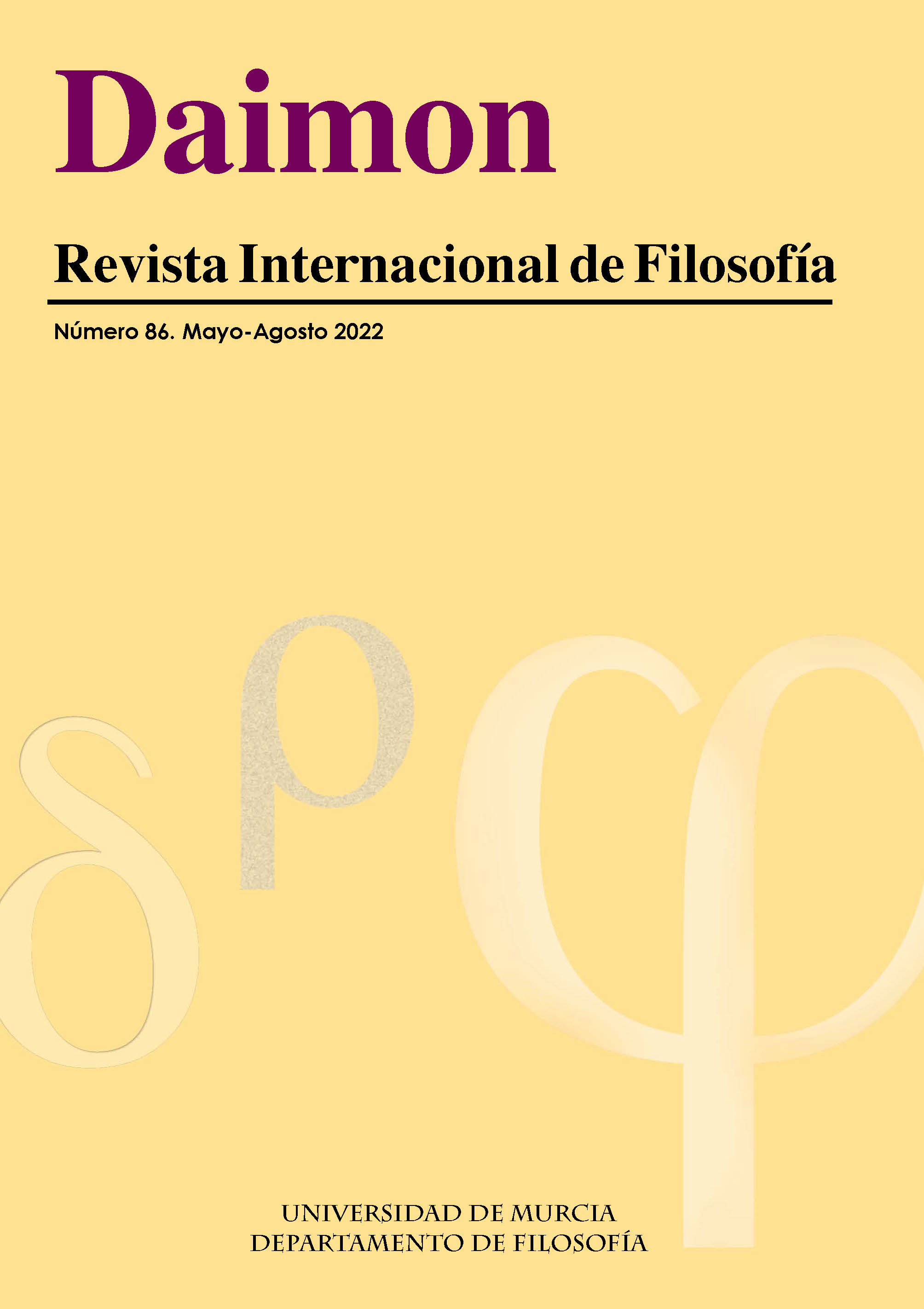Condillac's proto-ethological thinking. Enlightened Roots of the Study of Animal Behavior
Abstract
In this paper, we try to emphasize Condillac's thought, as an important exponent of the French Enlightenment, interpreting it as an advance of contemporary ethology. Thanks to his grounding naturalism, Condillac created a primitive ethology of the animal statute and animal faculties in their own specificity. This account is not dissolved in a mere anthropology.
Downloads
-
Abstract952
-
PDF (Español (España))698
-
HTML (Español (España))368
References
Anderson, T. L. y Donath, M. (1990), “Animal behavior as a paradigm for developing robot autonomy”, Robotics and Autonomous Systems, 6, 1-2, pp. 145-168.
Armstrong, D. M. (1978), “Naturalism, materialism and first philosophy”, Philosophia, 8, pp. 261-276.
Ayala, F. J. (1968), “Biology as autonomous science”, American Scientist, 56, 3, pp. 207-222.
Berecz, J. M. (1976), “Toward a monistic philosophy of man”, Andrews University Seminary Studies, 14, 2, pp. 279-288.
Buffon, G. L. L. (1749), Histoire naturelle, générale et particulière, Paris: Imprimerie Royale.
Cano Espinosa, D. (2008), “Autonomía y no reduccionismo de la biología en el pensamiento biofilosófico de Francisco J. Ayala”, Pensamiento, 64, pp. 267-287.
Condillac, E. B. (1754), Traité des sensations, a Madame la Comtesse de Vassé, vol. I-II, Londres/París: Deburé.
Condillac, E. B. ([1788] 1780), La logique ou les premiers dévoleppements de l’art de penser, Paris: L’Esprit/Deburé.
Condillac, E. B. (1798), La langue des calculs, Paris: Ch. Houel.
Dagonet, F. (2004), L’animal selon Condillac. Une introduction au Traité des Animaux de Condillac, Paris: J. Vrin.
De Waal, F. B. M. (2011), “What is an animal emotion”, The Year in Cognitive Neuroscience. Annals of the New York Academy of Sciences, 1224, pp. 191-206.
King-Farlow, J. (1973), “Monism, naturalism and nominalism. Can an atheist’s world view be logically expressed?”, Laval théologique et philosophique, 29, 2, pp. 123-142.
Klein, Z. (2000), «The ethological approach to the study of human behavior», Neuroendocrinology Letters, 21, pp. 477-481.
Lestel, D. (1996), L’Animalité, Paris: Hatier.
Lestel, D. (2001), Les origines animales de la culture, Paris: Flammarion, Paris, 2001.
Lestel, D. (2004), L’animal singulier, Paris: Seuil, Paris.
Lestel, D. (2014), «The question of the animal subject», Angelaki, 19, 3, pp. 113-125.
Lestel, D., Brunois, F. y Gaunet, F. (2006), «Toward an etho-ethnology and ethno-ethology», Social Sciences Information, 45, 2, pp. 155-177.
Lorenz, K. (1935), «Der Kumpan in der Umwelt des Vogels. Der Artgenosse als auslösendes Moment sozialer Verhaltungsweisen», Journal für Ornithologie. Beiblatt, 83, pp. 137-213.
Lorenz, K. (1943), «Die angeborenen Formen möglicher Erfahrung», Zeitschrift für Tierpsychologie, 5, pp. 235-409.
Neira, H. (2013), «El impenetrable corazón animal: Descartes y Condillac ante los animales», Filosofía Unisinos, 14, 3, pp. 226- 241.
O’Neal, J. C. (2000), «L’Évolution de la notion d’expérience chez Bouiller et Condillac sur la question de l’âme des bêtes», Recherches sur Diderot et l’Encyclopédie, 29, pp. 149-175.
Romero, J. y Mejía Fernández, R. (2019), «La teoría antropológica de Jürgen Habermas: un naturalismo débil entre Kant y Darwin», Cuadernos Salmantinos de Filosofía, 46, pp. 113-140.
Copyright (c) 2022 Daimon Revista Internacional de Filosofia

This work is licensed under a Creative Commons Attribution-NonCommercial-NoDerivatives 3.0 Unported License.
Las obras que se publican en esta revista están sujetas a los siguientes términos:
1. El Servicio de Publicaciones de la Universidad de Murcia (la editorial) conserva los derechos patrimoniales (copyright) de las obras publicadas, y favorece y permite la reutilización de las mismas bajo la licencia de uso indicada en el punto 2.
2. Las obras se publican en la edición electrónica de la revista bajo una licencia Creative Commons Reconocimiento-NoComercial-SinObraDerivada 3.0 España (texto legal). Se pueden copiar, usar, difundir, transmitir y exponer públicamente, siempre que: i) se cite la autoría y la fuente original de su publicación (revista, editorial y URL de la obra); ii) no se usen para fines comerciales; iii) si remezcla, transforma o crea a partir del material, no podrá distribuir el material modificado.
3. Condiciones de auto-archivo. Se permite y se anima a los autores a difundir electrónicamente las versiones pre-print (versión antes de ser evaluada) y/o post-print (versión evaluada y aceptada para su publicación) de sus obras antes de su publicación, ya que favorece su circulación y difusión más temprana y con ello un posible aumento en su citación y alcance entre la comunidad académica. Color RoMEO: verde.











